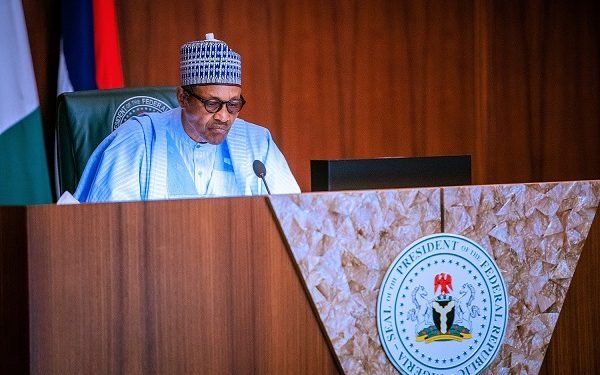
President Muhammadu Buhari has inaugurated an 18-member Presidential Steering Committee on Alternate School Programme (ASP).
At the inauguration which took place at the Presidential Villa Tuesday Buhari charged the ministry of Humanitarian Affairs, Disaster Management and Social Development to coordinate and lead the deployment of a National Plan which will address the issue of out-of-school children in the country.
According to a statement signed by the special assistant to the minister of Humanitarian Affairs, Disaster Management and Social Development, Nneka Ikem Anibeze, President Buhari said that it was unacceptable to see children abandoning formal school to engage in menial jobs and child labour in the markets, streets and workshops.
‘‘While we continue to sustain our efforts on providing formal and conventional education through the activities of the Universal Basic Education Commission, under the Federal Ministry of Education, it is still a common sight to notice children abandoning formal school to become apprentices in shops, workshops and markets, whilst many others choose to loiter at markets, become cart pushers and hawkers. These are not acceptable,” he said.
President Buhari implored all members of the committee to take the assignment with utmost seriousness adding that “the future of our young people is at stake”.
Earlier, the Chairman of the Committee and minister of Humanitarian Affairs, Disaster Management and Social Development, Sadiya Umar Farouq, thanked the President for his support to the Ministry and for granting the approval for the Alternate School Programme.
The minister noted that the number of out-of -school children was increasing at an alarming rate, adding that there is urgent need to address the problem with deft response required of such an exigent matter.
Umar Farouq assured the President that the Committee will leverage on the Ministry’s social protection instruments, including N-Power, the Conditional Cash Transfer and the Home-Grown School Feeding Programmes, to provide tailored delivery mechanisms targeted at the country’s out of school children.
She said: “Education serves as a catalyst for the all-round growth and development of any individual. Thus, for any nation to thrive, adequate investment in human capital, by increasing access to quality education, must be prioritised. The United Nations identifies quality education as one of the most powerful and proven vehicles for attaining sustainable development.
“Those mostly affected by this scourge include the girl-child, predominantly in the North, Almajiri-children in the North, children of nomadic pastoralists spread across the country, incidence of boy child drop-out mainly in the South-East and South-South regions, street children in the South-West, commonly referred to as area boys, particularly around the Lagos axis, children of migrant fishermen in the South-South, and more recently the internally displaced children in the North-East, occasioned by the Boko Haram insurgency and insecurity.
“By integrating basic education with religious education and vocational training, the Alternate School Programme will increase access to education, without altering social norms and cultures. Consequently, every child, including those in the most peculiar of circumstances, will have access to learning opportunities.”
According to UNICEF, Nigeria currently has the highest number of out of school children globally, while it is estimated that approximately 10.5 million children aged 5 to 14 years are not in school. Statistics also show that only 61 per cent of children within the 6 to 11-year age bracket regularly attend primary school while the North has an abysmal net attendance rate of 35.6 per cent.
The Alternate School Programme, is an innovative and flexible approach to learning and skills development, ensuring that education is designed to specifically address the needs of the target beneficiaries and is delivered conveniently, without unnecessary encumbrances. By targeting out of school children, the program will ensure that more children are equipped with basic literacy skills, reasoning capabilities and technical and vocational expertise that will enable them to live fulfilled lives.
It is also expected to significantly reduce the number of out of school children in Nigeria, provide access to inclusive and equitable quality education, eliminate child labour, facilitate the effective integration of religious discipline and vocational training with basic education, provide opportunities for children to develop life supporting skills from vocational and entrepreneurship training to improve their chances of future success, improve the quality and outcome of basic education in the country and foster tolerance, unity, and integration of all children with diverse backgrounds into the larger society.
The Presidential Steering Committee has been mandated to refine the vision of the initiative, ensure engagement and effective uptake of the ASP initiative across the country, review and approve all work, implementation plan, expected deliverables, feedbacks and reports as proposed and undertake any other task that can enhance the effective delivery of the initiative by the Ministry.
BLUEPRINT








































